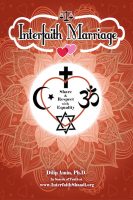In this book, the author has presented personal life experiences from 81 interfaith couples and their parents as appeared on InterfaithShaadi.org (names have been changed for their privacy).
Approximately 200 people shared their Christian-Dharmic interfaith dating/marriage experiences at InterfaithShaadi.org. The author has selected 14 representative cases for readers of this book. In a few cases, the author (Admin)’s views are also included. Let’s see what Ashwini has to say.
Ashwini says:
Well… I am going to comment briefly and share our experience of a Christian and Hindu interfaith marriage of 24 years. We have definitely evolved in our viewpoints with each decade of marriage, and as life has given us more experience. Fortunately, we have a similar viewpoint on religions, in that they are human constructs with plenty of flaws, often with political purpose. I think my core beliefs are:
1. No religion has a monopoly on reaching God and the divine. We reject this wholeheartedly. We reject exclusivity found in the Abrahamic religions. By their standards, I am a pagan, a kafir, and the “unchosen;” not very flattering names for child of God.
Baptism, which 2 of my kids went thru, was presented as more of starting a spiritual life, rather than a commitment to Jesus and Christianity, when the Methodist pastor performed it. We explicitly stated we embraced both religions during this time. Since then, we have gone more towards the Dharmic tradition, as worshipping Jesus as the only messenger of God was too restrictive.
2. Every religious tradition when you dig deep, tries to address the fundamental challenge of how to live, why are we here, what is mortality. If you get past the superficial names of god, the rituals, the stories, they are the same issues. The answers, however, are somewhat different.
3. Polytheism vs. Monotheism—let’s see. How can the Christians really claim monotheism being somehow superior to the other… they themselves need the Holy Trinity to describe God. Then throw in the Saints and Popes and Mother Mary, the Apostles and it sounds polytheistic, doesn’t it? How about the Muslims worshipping Mohammed as well as the concept of a God? Why have both?
Perhaps we humans just need multiple characters to describe the Divine.
4. We try to pick the best values of each religion as the values we concentrate on: for Christianity, it is love, charity and forgiveness. From Hinduism, the concept of Karma, Dharma, Bhakti and controlling ones desires. We have tried to strip away the dogma that has little to do with living a spiritual and righteous life.
I can say raising children in both traditions has been challenging, but it has hopefully made our kids critical thinkers. They have embraced the values of human decency, kindness to animals (they are all vegetarians) and an appreciation of both cultures. My worry is that what we have given them, especially the Dharmic viewpoint will get lost or diluted out with the next few generations. However, I remind myself that this is happening in kids from same-religion families. We cannot control the future; just influence it. —Ashwini
 A Chapter from the book Interfaith Marriages: Share and Respect with Equality is posted here. View some of others chapters from the book here.
A Chapter from the book Interfaith Marriages: Share and Respect with Equality is posted here. View some of others chapters from the book here.
Video messages by the author
How to purchase the book (as low as Rs.270 or $14.99).
Return to Home, Blogs, How to Share? Facebook, Youtube, Twitter, Book, Media.

